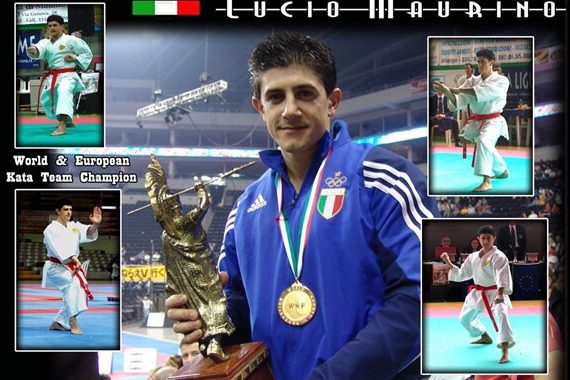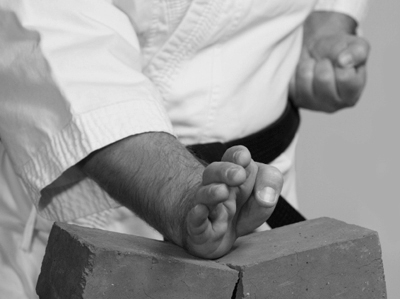If there is one thing I just can’t stand, then it has to be bad teachers.
It doesn’t have to be a Karate teacher. It can be a yoga instructor, a high school teacher, or even a driving school instructor! Teaching is still teaching. And a bad teacher is still a bad teacher.
And I don’t like them.
At all.
Let me tell you a story:
One day, a few “moons” ago, when I was living and training in Okinawa, I saw a Karate teacher instructing some of his foreign students. This teacher was (is) a somewhat famous Goju-ryu teacher in Okinawa, and the students were probably members of his organization in a branch dojo in some country far away.
Now, during the entire session, I can’t recall hearing even one positive word from this teacher at all! For two hours straight he kept repeating phrases like: “Your kicks are too slow” or “Your punches are too weak” or “Your stances are ugly” and so on. Again and again.
The students (who probably had travelled a long way to be instructed by this man) were very kind and loyal though. They listened carefully to the feedback (insults), bowed over and over, and tried harder and harder.
In vain.
The teacher just sat there in front with his glasses and tried to look cool, throwing out his “wisdom” now and then. I don’t even think he showed or explained a single technique for two hours! When the training was over, the humble students bowed deeply several times again, and even tried to say “thank you very much” in Japanese a couple of times. The teacher just nodded a little.
I felt sick.
I hope they don’t think this is what a good instructor is supposed to be like! But most likely they think so. I mean, the sensei is quite famous, has a nice grade and all… Can’t go wrong with all those titles! He has to be one of the best instructors around, right?
Not so true.
Now, I’m not saying he was (is) a bad person but he sure as hell wasn’t a good teacher. As you see, there are bad Karate teachers even in Okinawa. Just like there probably are some bad Yoga instructors in India, Kung Fu teachers in China and Kickboxing instructors in America. It doesn’t matter what, where or who.
All that matters is how.
“How do you become a good instructor?”
How do you become somebody that not only teaches and inspires, but also makes people happy and makes the transmission of knowledge fun?
I believe I have the answer.
And I can tell you right now, it’s not by standing in front of the class with your arms crossed, screaming how bad everyone are. Though there evidently are people who do exactly that…
Let me present my two golden rules for Karate instructors.
They are very simple.
Actually, they are for any instructor, teacher or tutor. Not just Karate (or Kobudo) teachers. But since this website is supposed to be about Karate… you get the point.
You don’t even have to be a “sensei” to follow my two golden rules. You can (and should!) use them for instance if you are just helping somebody in class, teaching your mom or simply trying to instill some knowledge in a friend. These two golden rules are the result of (too) many years of watching bad instructors.
Japanese or not.
Now, before I reveal them, let me explain why I chose to call them “golden”. The reason is…
They contain more than what they seem to do. You know those Russian wooden dolls? I think they’re called Matryoshka dolls, or nested dolls, or something. When you open the doll there is an identical, but smaller, doll inside. And then when you open that doll, you find yet another identical, but smaller, doll inside (see pic).
These rules are like those dolls.
Here they are:
The 2 Golden Rules for Karate Instructors
1. Show everything yourself.
When I came up with these rules, I thought “What does a good instructor do?”. And then I thought “What does a bad instructor not do?”. This was the first answer that popped up in my head.
And like you see, it’s really simple.
A good instructor always – always – shows everything himself/herself. Because a good instructor has nothing to hide. They happily show the technique again and again. And then once more. They never stand with their arms crossed. A good teacher loves training, and would never waste an opportunity to train. Therefore, they do everything themselves. When I lived in Okinawa, all of my senseis did the whole warm-up, the whole kihon, and often every single kata together with the students. Sometimes the sensei was close to 80 years old, but that never stopped them!
A great teacher simply loves training too much to stand still.
So, what good will come if you follow this first point?
Let’s see:
- The instructors technique improves: Since the instructor gets to train every training, instead of just standing still, he/she will gradually improve. This is nothing new. And when you are an instructor, you can’t do the techniques sloppily. You need to show a good example. Therefore you get good, proper, training. Most instructors don’t have time to train daytime by themselves, so this is important.
- The students see how it actually should be done: Instead of just guessing from the instructors explanations, the students see how somebody with experience does it. This is invaluable.
- The students feel closer to the teacher: Instead of feeling “below” the teacher, who seems to stand on some invisible pedestal, the students feel more “together” with the teacher, and develop a better bond. The whole atmosphere changes in the dojo.
- The content of the training remains practical: If the teacher does everything himself, he can’t choose techniques that don’t work or are bad (or simply strange). Because, let’s face it, some instructors like to teach flashy techniques that simply don’t work. They show it in slow speed, maybe once, and then say “Now do it ten times faster with power… and add a backflip”. In reality, it’s impossible. However, if the instructor has to do every technique himself/herself, the techniques will be physically possible, practical, and realistical.
2. Give everyone at least one positive, constructive, comment.
This is the second rule. Perhaps a little bit harder than the first one, but still simple. Give every students at least one positive, constructive, comment. It doesn’t have to be much. One is enough. But it has to be positive and constructive.
Because, believe it or not, most people don’t train Karate to become grandmasters.
They train because they want a break from their work/school, they want to meet other people, sweat a little, learn a little self-defense, be a little smarter, and most of all have a good time. They come to the club because they want to. Nobody forces them. Therefore, they should always feel that they leave with something new. They should leave the dojo feeling a little smarter, stronger and better than when they came. Always.
Students should constantly feel that they are improving.
And they do that when you give them a positive, constructive, comment.
Or else, why should they come to the dojo in the first place?
As a bonus, this will also happen:
- The students will become better and more: When you get a good constructive comment, you improve and feel good. And when you feel good, you do good. And when you have good students, the word spreads.
- The instructor becomes better: When the instructor constantly has to search for points to improve in all of the students, he/she will invariably improve his own technique and knowledge. “Hmm… if John turns his back foot 32,5 degrees to the right, he will be able to extend his knee better and therefore generate more power from his great hip movement”. Imagine if the instructor thinks thoughts like this about every student, every training. The teacher is bound to improve.
- The teacher, and the students, will be happier: When everyone feels that the instructor cares about them, they become happy. That makes the sensei happy. And happiness spreads like a virus. We have all, at least once in our lives, laughed simply because somebody else is laughing, right? We don’t know why, we just do it. It spreads. That’s what happiness does (and for you greedy $$$ senseis out there, the best customers are happy customers).
And… that’s about it.
Those are my two golden rules for Karate instructors. Already forgot them?
1. Show everything yourself.
2. Give everyone at least one positive, constructive, comment.
Follow these, and success will be waiting around the corner. Hopefully. If not, at least a bunch of dedicated, happy, loyal students will be waiting there. Unless you screwed up, in that case a bunch of angry ex-students with sharp sticks might be waiting around the corner.
That’s what I think.
So use my two golden rules to improve yourself, your students, and the world. I have seen far too many teachers who think the world circles around them.
“A good teacher is like a candle – it consumes itself to light the way for others.”
Make a change.



30 Comments